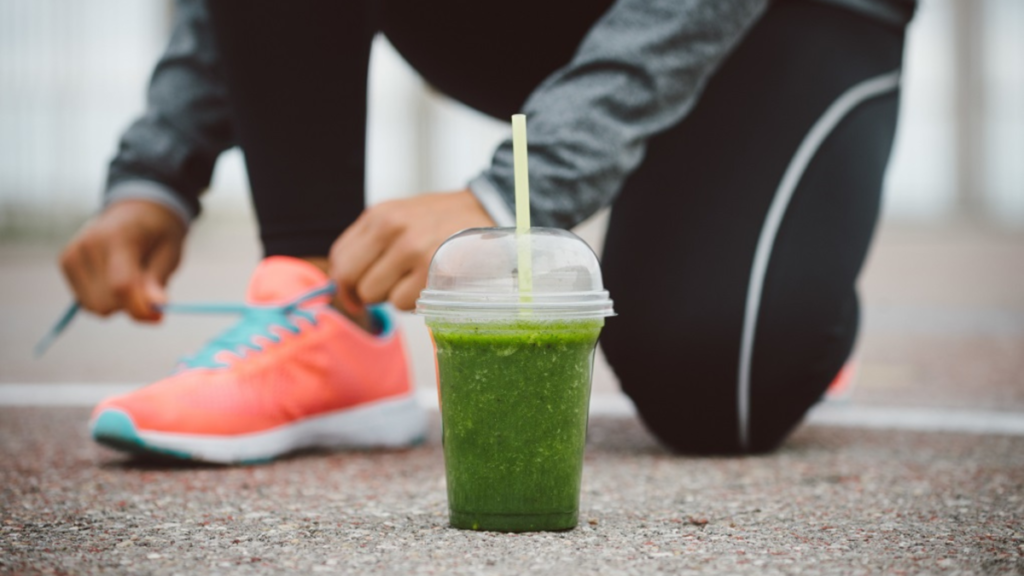
Eating something before we head out the door for a run is especially important for those of us who like to get our run done early in the morning and use that momentum as motivation to carry us through the rest of all day. Choosing what exactly to eat before your early morning run can have a significant impact on how well you are able to complete your morning workout.
Before heading out on a run, eat something light and easily digestible such as a piece of fruit. Make sure you are well hydrated and drink a half cup of water before starting your run.
Let’s take a closer look at each and every one of these pre-run fueling options to see which of them will work best for you, irrespective of whether you go for your run early in the morning, around midday, or later on in the afternoon.
What To Eat And Drink Before A Run
Before starting a run, fuel up with some fruit or half a sports energy bar. Drink some water before heading out too so that you can maintain hydration levels.
The ideal pre-run snack will be something that is easy to grab and quick to digest. Therefore something along the lines of a piece of fruit such as a banana on an orange will be a good choice. If you don’t have access to any fresh fruit then something like half of a sports energy bar can work as well.
One of the things that I like about having an orange before heading out in the run, especially during the summer heat is that the vitamin C content of the orange can help to delay the onset of any heat exhaustion. This is especially important if you’re living in a really hot climate like I do.
If you have a little bit more time to prepare your pre-run snack and you can do something along the lines of an English muffin with honey or jelly. One thing that I’ve noticed fitness YouTuber, Nick Bare, doing before going out on a long run of between 10 and 15 miles is taking an English muffin, then adding peanut butter banana, and honey. That seems to get him through his long run without any massive drop-off in his energy levels.
When it comes to the hydration side, before heading out in a run, it is essential to make sure that you are well hydrated. Something along the lines of a half-cup of water before your head out should help you get through shorter runs. For longer runs you’ll need to take water with you I usually use my Nathan handheld water bottle (available on Amazon). This is in addition to the half-cup of water I have before I leave.
When you drink water before heading out on your run, don’t drink too much water, and give yourself approximately 5 minutes to let the water settle. One of the worst feelings, when you start a run, is too much water sloshing around in your belly.
Is It Best To Run On An Empty Stomach
It is a good idea to always eat something before starting a run so that you can finish your run safely. If you run on an empty stomach be prepared to reduce your intensity to avoid feeling light-headed or faint.
The general recommendation is to always eat something before heading out on a run. You want to make sure that your body has sufficient fuel to be able to safely and efficiently complete your workout.
That said, what I have done on more than one occasion is deliberately do what is called a fasted workout. That is where I get up in the morning and only have a cup of water before heading out and doing a really low-intensity run. I make sure that I stay really well hydrated throughout this type of run. If you want to try something similar yourself, be sure to take a walk break the moment you start to feel light-headed.
I only ever do my fasted workout runs early in the morning when the temperatures are still relatively cool. Running in the heat of the day requires way more energy and the chances of getting light-headed and faint are much higher when you are running in the heat. If I happen to be running in the middle of the day or later on in the day I’ll never do so on a completely empty system.
How Do I Get Energy Before A Run
The way to get energy before a long run or race is by having a relatively high carbohydrate, and moderate protein meal 3 to 4 hours before your run. If your run is longer than 90 minutes, take an easily digestible snack such as fruit to top up every hour.
If it is your normal style of training to do your run later during the day then make sure that you fuel up with a relatively high carbohydrate and moderate protein meal approximately 3 to 4 hours before heading out on a long-distance training run or lining for a race.
Approximately half an hour to an hour before your run you can have a really light easily digestible high carbohydrate snack such as a piece of fruit or half of a sports energy bar.
If your run is going to be taking longer than 90 minutes to complete then it is ideal that you take some sort of fuel with you. That can be in liquid form like a sports drink, or some kind of more solid snack such as an energy bar or sports gel.
This is because most of us have about 90 minutes of glycogen stores in our blood, liver, and muscles. If you allow your glycogen stores to become completely depleted you will not be able to continue at the same intensity and might not be able to complete your workout or race.
Is Coffee Good Before A Run
You can drink coffee before a run. Drinking coffee without milk or cream can boost athletic performance by up to 5% in endurance events.
Having a single cup of coffee before heading out on a run can boost your speed and endurance with minimal side effects. I wouldn’t suggest adding milk or cream to your coffee before heading out on a run as that could cause some sort of digestive problems while you’re running.
The caffeine in coffee helps prevent the feelings of fatigue from setting in during the course of your run. In some instances, it can be as much as a 5% boost in performance.
If you want to learn more about all of the benefits that caffeine has for your sporting performance you can read this article that I wrote here on Trail Run Planet that details exactly how much of a performance boost you can get from consuming caffeine before and during an endurance event.
What Foods To Avoid Before Running
Avoid high fiber and spicy foods before running as they can cause gastrointestinal stress and cramps. Foods that are heavy and slow to digest will divert blood and oxygen to your stomach, away from your legs, and cause you to run slower.
When it comes to the types of foods to avoid the basic rule of thumb is to look at what your digestive system can cope with.
Any foods that are slow or difficult to digest will require your body to divert blood flow to your stomach in order to digest the food rather than delivering oxygen to your muscles needed for your run.
Another factor relating to your digestive system will be that you do not want to have gastrointestinal discomfort in the middle of your run. So in order to avoid gastrointestinal discomfort, stay away from high-fiber foods such as legumes broccoli artichokes, and other high-fiber vegetables. On the fruit side, I’d stay away from things like apples and pears.
I would also take care of heavy slow-to-digest foods such as cheese, red meat, bacon, and other relatively high-fat foods. I have also tended to notice that really spicy food just before heading out on a run tends to give me some stomach cramps from time to time.
Can You Run On A Full Stomach
Running on a full stomach will cause stomach cramps and make you feel sick. Rather eat your large meal after your run.
I know that we’ve been talking about the importance of fueling up before heading out on a run. However, too much of a good thing is not always better. If you absolutely stuff your stomach to absolute bursting point and then try and run, then expect to have are really painful belly, reduced sporting performance, and in all likelihood nausea.
Instead of stuffing yourself with the food just before you head out to my run, rather stick with a light snack before your run. Have your good recovery meal half an hour to an hour after you have completed your run.
How Long After Eating Can I Run
You should wait between 3 and 4 hours after a large meal before running. You should wait between 30 and 60 minutes after a small, light meal before running. A very light pre-run snack such as fruit can be eaten 15 minutes before running.
Running too soon after a large meal can make you feel sluggish and even sick. Therefore, as a general guideline, you should wait somewhere between three and four hours after a large meal before running.
If you’ve had a relatively small meal then you should wait a minimum of 30 minutes to an hour before running.
A very light pre-run snack such as a piece of fruit can be eaten as little as 15 minutes before starting your run.
If you are going to be having a large meal it is best to plan that meal for after you have completed your run workout as part of your recovery process.
